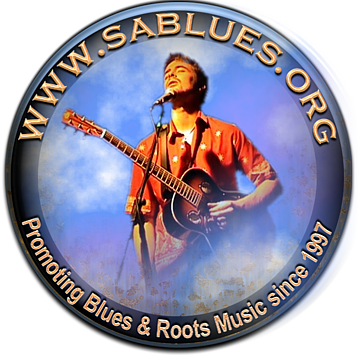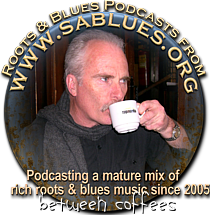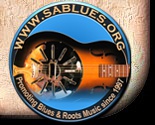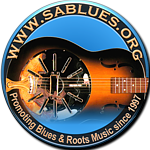www.sablues.org
Promoting roots and blues since 1997. Podcasting twice a month since 2005.
sablues.org 'Webalizer' stats (2023/month)
Podcast downloads / month 8,500+
RSS Hits / month: 86,000+
Fortnightly E-Newsletter emailed to 2000+ subscribers. Subscribing to www.sablues.org is free.
www.sablues.org is a non-profit, non-commercial organisation. Running costs are met by the editor. All time is given freely.

Promoting roots and blues since 1997. Podcasting twice a month since 2005.
sablues.org 'Webalizer' stats (2023/month)
Podcast downloads / month 8,500+
RSS Hits / month: 86,000+
Fortnightly E-Newsletter emailed to 2000+ subscribers. Subscribing to www.sablues.org is free.
www.sablues.org is a non-profit, non-commercial organisation. Running costs are met by the editor. All time is given freely.

Attention Musicians, Promoters and Distributors!
Contact the editor ( via email or telephone 0408 085 821 ).
Post hardcopy review items to:
sablues.org
49 Bowen Road
Tea Tree Gully SA 5091
Australia
(in this day and age, softcopy is preferred)
Send digital press kits and softcopy promotional material via email
Www.sablues.org is a non profit organisation. Services offered freely.
Contact the editor ( via email or telephone 0408 085 821 ).
Post hardcopy review items to:
sablues.org
49 Bowen Road
Tea Tree Gully SA 5091
Australia
(in this day and age, softcopy is preferred)
Send digital press kits and softcopy promotional material via email
Www.sablues.org is a non profit organisation. Services offered freely.
David Stoeckel
Editor and coffee consumer at www.sablues.org.

Editor and coffee consumer at www.sablues.org.

SOME PAGES AT SABLUES.ORG ARE NO LONGER UPDATED.
They are available in our archives and may be of interest to you.
AUDIO TRACKS A selection of some great roots and blues tracks dating back to 1997.
ROOTS FOCUS A selection of interviews with 'roots' musicians.
DVD REVIEWS An appraisal of roots and blues DVDs
ADVERTISING Ads have been discontinued at sablues.org
LINKS The efficiency Google, Bing etc have made this page obsolete.
CD REVIEWS With our focus now on promotions thro' Podcasts, CD reviews are rarely done.
TOURING Now incorporated in the Gig Guide
They are available in our archives and may be of interest to you.
AUDIO TRACKS A selection of some great roots and blues tracks dating back to 1997.
ROOTS FOCUS A selection of interviews with 'roots' musicians.
DVD REVIEWS An appraisal of roots and blues DVDs
ADVERTISING Ads have been discontinued at sablues.org
LINKS The efficiency Google, Bing etc have made this page obsolete.
CD REVIEWS With our focus now on promotions thro' Podcasts, CD reviews are rarely done.
TOURING Now incorporated in the Gig Guide
About Roots and Blues Music.
"At the beginning of the 20th Century, the term "folk music" was used by scholars to describe music made by whites of European ancestry. Folk songs communicated the hopes, sorrows and convictions of ordinary people's everyday lives. The definition of folk music has been expanded to include the song styles of African Americans of the Mississippi Delta, Cajuns of southwest Louisiana, Native Americans and Mexican-Americans. It was sung in churches, on front porches, in the fields and other workplaces, while rocking children to sleep, and at parties. The melodies and words were passed down from parent to child, though songs - and their meanings - often changed to reflect changing times.
"Hillbilly" and "race" records become profitable recording industry genres that popularize regional music. The emergence of radio broadened audiences and helped the cross-fertilization of various musical forms. In the 1960s, awareness of folk songs and musicians grew, and popular musicians began to draw on folk music as an artistic source as never before. "Folk music" then became a form of popular music itself, popularized by singer/songwriters such as Bob Dylan, who helped pioneer the intimate, often acoustic performing style that echoed that of community-based folk musicians.
Music writers, scholars and fans began to look for new ways to describe the diverse array of musical styles still being sung and played in communities spreading across America and now throughout the world. The term "roots music" is now used to refer to this broad range of musical genres, which includes blues, gospel, traditional country, alt.country, folk, cajun and zydeco. " *

